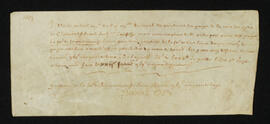Discusses Trevelyan's tendency to 'mysticism', quoting him as saying 'we should be able... to rise above... good and evil, in the way that mystics claim to do'; fears that he is 'victim of analogy'. Uses the illustration of an artist who succeeds in creating something 'true to life'; draws a line marked 'O' as the place where 'the painter equals the object', with two arrows leading from it, 'one progressive which leads to Liberty', the other 'regressive' which gets further and further from the object. Discusses the works of art which are at each end: towards the 'regressive' end are 'puerile works which attempt representation crudely', and at the other works which 'more and more voluntarily disappear from appearance'; yet there are many people who cannot distinguish between the two. Moves on to discuss knowledge and reason. Calls Trevelyan 'too English', though he seems to belong to 'the rare class of English contemplatives', and may not be interested in the 'noble art of boxing'; talks about prize fights, before which journalists publish all possible measurements of the two combatants. Sometimes predictions are wrong: he gives the fight between Bombardier Wells and Carpentier as an example. Quality, that is 'the appearance of freedom', plays an important role, in the 'cosmos' as well as in boxing. Draws another line illustrating the relationship between necessity, reason, and liberty. Thinks there is a 'mode of knowledge that goes beyond reason' which he calls 'Free Spirit', and which begins at 'the exact point when action... all judgements... and the role of the Useful' stop, yet all these elements must first have been passed through, or one makes the errors of Lao Tse, Plotinus or Parmenides respectively. Most people who claim the insufficiency of reason get to that point through 'regression', such as Pascal. Despite his 'puerility and his shocking vanity' Bergson has had 'some intuitions of high freedom' particularly in his thoughts on language, which is the 'ultimate form of determinism which it is necessary to defeat'. Has more to say, but has written a great deal; will talk more if Trevelyan wishes it.
Welcombe, Stratford on Avon. -Winter has returned and the world is white again, but there has been a thaw today and he hopes it extends to Paris. Very interested in Robert's account of the 'local arrangements' of his organisation [the Friends War Victims Relief Committee]. Aunt Anna [Philips] much appreciated her visit to Shiffolds, and was glad to see the [Thomas Sturge] Moores. Julian seems to be doing his best to be a good schoolboy; very good that Robert and Elizabeth know so much about the school. Very good to have George back again, though he and Janet have 'the great worry and anxiety' of Humphry having scarlet fever; he is getting excellent care in an isolation hospital at Berkhamsted. Sir George is leading a quiet life and a happy, except for 'public, and above all general financial, and trade, anxieties'; is reading a good amount of the classics every day, and next month plans to read Lucretius in his uncle [Macaulay's] copy, which is 'very copiously annotated, and marked'. Has been reading so much about the Epicureans in [Cicero's] "De Natura Deorum" and "De Officiis" that his curiosity has been revived; like a man who has been reading [Pascal's] "Provincial Letters" and wants to know 'what the Jesuits have to say for themselves'.
Welcombe, Stratford on Avon. - Glad to hear that Robert has landed safely; 'awful to read' of the passengers on the cross-Channel boats kept at sea all night by bad weather; asks 'is even Assisi worth such a price?'. Would love to see Arezzo again and wants to know what the hotel was like; it used to be spoken of as the 'best hotel between Florence and Rome', before Brufani [at Perugia], and he thinks his parents and sister were 'the first names in the hotel book'. Notes what Robert says about [Samuel Butler's] "Fair Haven" and will see to it. Cannot 'manage Conrad as a novelist', nor Chesterton as an essayist. has been reading about the Phalaris controversy with great 'interest and amusement'; George gave him a copy of Attenbury's 1698 book a while ago, and he got Bentley's "Phalaris" as a prize at Harrow; they bear out everything that [Thomas] Macaulay says. Good to be 'in company with so strong and able a man as Bentley', whatever the topic; he is an even greater controversialist than Newman, Porson, Gibbon or Pascal.
Welcombe, Stratford on Avon. - They are 'deep in snow', and people are toboganning. He is working quietly; finding it hard to read much of any book for any length of time. Is reading Ruskin aloud to Caroline, and some Pascal for himself. Also reading "Bleak House", which is 'a wonderful book in parts, and well sustained all through'. Caroline has a 'great consignment of toys'; would like to see Paul among them.
